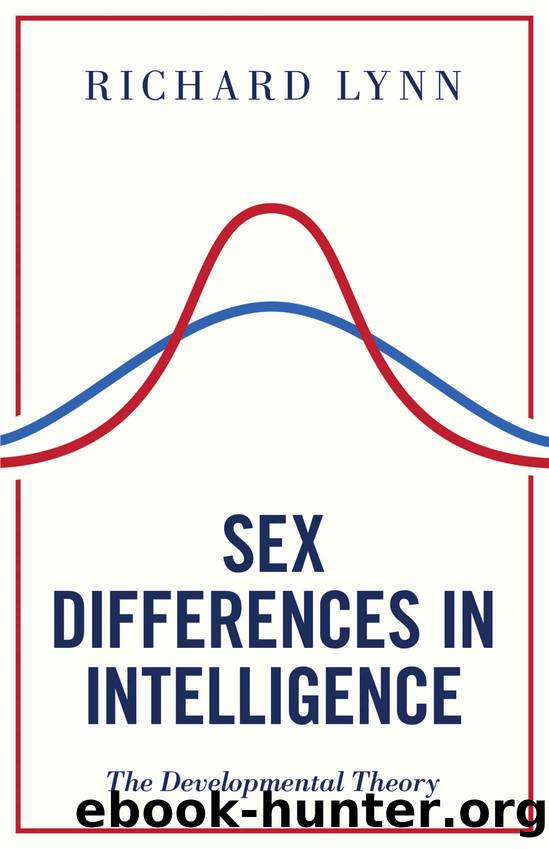Sex Differences in Intelligence: The Developmental Theory by Richard Lynn

Author:Richard Lynn [Lynn, Richard]
Language: eng
Format: azw3
Tags: IQ, bell curve, Tatu Vanhanen, intelligence
ISBN: 9781914208676
Publisher: Arktos Media Ltd.
Published: 2021-12-08T00:00:00+00:00
10h. General Knowledge
Age differences in sex differences in general knowledge are available in the Information subtest of the Wechsler tests. In 8 studies of the WPPSI for 4- to 6-year-olds, there is a small median male advantage of .08d, given in Table 5.1. In 17 studies of the WISCs for 6 to 16 year-olds, males obtained a higher median score than females of .30d, given in Table 5.6. In 23 studies of the WAIS, males obtained a higher median score than females of .44d, given in Table 5.4. Lynn & Irwing (2002) show that this male advantage is not attributable to a bias in favour of males on these tests.
A large male advantage in adults in general knowledge of .68d is reported by Ackerman, Bowen, Beier & Kanfer (2001). This has been confirmed at .51d by Lynn, Irwing & Cammock (2002) in a study that identified 19 domains of general knowledge, six first order factors and one second order general factor. It was found that males obtained significantly higher means than females on the second order general factor of .51d and on four of the six first order factors identified as information about Current Affairs, Physical Health and Recreation, Arts and Science. Females obtained a significantly higher mean than males on the first order factor identified as Family. There was no sex difference on the remaining first order factor identified as Fashion.
Further studies showing a male advantage in general knowledge have been reported, including at .51d by Lynn, Irwing & Cammock (2002), Lynn, Wilberg & Margraf-Stiksrud (2004), Zarevski, Ivanec, Zarevski & Lynn (2007), Tran, Hofer & Voracek (2014) and Steinmayr, Bergold, Margraf-Stiksrud & Freund (2015). A male advantage in 15-year-olds in general historical knowledge in 26 nations has been reported by Wilberg & Lynn (1999). A likely evolutionary explanation of the male advantage in general knowledge is that much of general knowledge is concerned with activities of and conflicts between men, e.g., in history, the arts and politics, and males have more interest in these and hence more knowledge of them.
Download
This site does not store any files on its server. We only index and link to content provided by other sites. Please contact the content providers to delete copyright contents if any and email us, we'll remove relevant links or contents immediately.
The Art of Thinking Clearly by Rolf Dobelli(10489)
The 5 Love Languages: The Secret to Love That Lasts by Gary Chapman(9815)
Mindhunter: Inside the FBI's Elite Serial Crime Unit by John E. Douglas & Mark Olshaker(9343)
Becoming Supernatural by Dr. Joe Dispenza(8217)
Nudge - Improving Decisions about Health, Wealth, and Happiness by Thaler Sunstein(7707)
The Road Less Traveled by M. Scott Peck(7603)
Mastermind: How to Think Like Sherlock Holmes by Maria Konnikova(7347)
Enlightenment Now: The Case for Reason, Science, Humanism, and Progress by Steven Pinker(7313)
Win Bigly by Scott Adams(7199)
The Way of Zen by Alan W. Watts(6614)
Factfulness: Ten Reasons We're Wrong About the World – and Why Things Are Better Than You Think by Hans Rosling(4742)
The State of Affairs by Esther Perel(4721)
Gerald's Game by Stephen King(4654)
Man's Search for Meaning by Viktor Frankl(4606)
The Confidence Code by Katty Kay(4260)
Thinking in Bets by Annie Duke(4227)
The Healing Self by Deepak Chopra(3580)
Hidden Persuasion: 33 psychological influence techniques in advertising by Marc Andrews & Matthijs van Leeuwen & Rick van Baaren(3565)
The Worm at the Core by Sheldon Solomon(3487)
